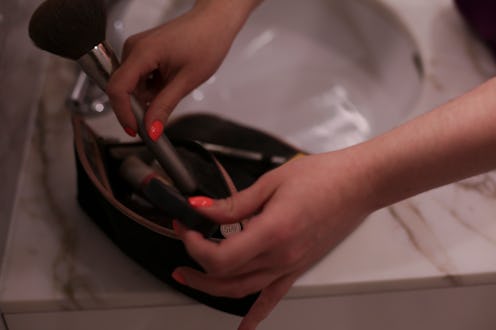Life
7 Things You’re Probably Not Washing Enough

We all know to wash our underwear after one use (hopefully) and to clean our dishes after every meal, but when it comes to other items we own, we may not be taking care of them as much as we are supposed to. You likely own a number of items you aren't washing enough, and the effects of letting things get too dirty are a little more disturbing than you might imagine. Germs can built up pretty quickly, and if you want to stay healthy and avoid any issues like skin problems, you'll want to start cleaning all your items, stat.
"I think it’s important for people to first understand the lifecycle of certain microbes, like viruses and bacteria, to help understand why regular cleaning and sanitizing is a very important step to stay healthy," says Nelson Matos, DO over email. "Microbes, like viruses and bacteria, can live on surfaces and household items, including toilet seats, toys, countertops, and more, for long periods of time — even years. When you use these items, you are at risk for contracting — and then spreading — the illnesses that these viruses and bacteria cause."
To keep your home safe and to keep your health in check, you'll want to start washing these seven items more frequently.
1Cleaning Supplies
Ironically, some of the dirtiest things around the house are cleaning items. "It may sound surprising, but you need to clean your cleaning supplies," says Summer Shadforth, Marketing Manager of Fantastic Cleaners Australia over email. "You also need to replace them with new ones on a regular basis. Mops, brooms, sponges and rags are a great home for bacteria. If not handled properly, instead of cleaning with them, you’ll do the exact opposite. You’ll spread the germs. To prevent this from happening, wash these items once a week in very hot water."
2Ceiling Fans
Most of us don't take the time to tend to our ceiling fans — but we should. According to Meg Roberts, president of cleaning company Molly Maid, we should be dusting them monthly. "Dust ceiling fans by turning fans off and placing a drop cloth or an old sheet on the floor, covering an area about twice the span of the blades," she says. "Using an extendable wooly duster to wipe the span of the blades. Pick up drop cloth and shake outside."
3Coffee Makers
For both regular drip coffee makers and single-serve machines like Keurigs, the water compartment and surrounding piping are the perfect environments for bacteria growth. "These areas are often moist and dark, which are ideal conditions for germs," says Morgan Statt, health and safety investigator at ConsumerSafety.org over email. "To make you feel better about pouring your morning cup every day, take out the removable parts of your coffee makers and clean with soap and hot water once a week. This will remove any residue that has built up and will help to kill any bacteria that may be lingering."
4Makeup Brushes
If you find yourself suddenly breaking out for no apparent reason, your makeup brushes may be to blame. "Every time you apply makeup with an already-used makeup brush, you're reapplying the microbes that live on your skin back onto your face," says Statt. "This can cause an overload of microbes that your skin isn't used to dealing with, thus spurring on clogged pores and acne." She suggests cleaning your makeup brushes once a week with warm water and liquid dish soap or shampoo.
5Computer Keyboards
It turns out our computers are pretty nasty. An analysis of germs on common tech items found that keyboards have over 20,000 times the amount of bacteria than your average toilet seat. "To clean your keyboard, shut down your computer and turn your keyboard upside down to shake out any debris that may be lingering underneath the keys," says Statt. "Use a damp microfiber cloth to clean the keys and in-between spaces."
6Bed Sheets
Most people do not wash their bedding and pillowcases as often as they should. "Studies have shown that many people only wash once or twice a month," says Dr. Dena Nader over email. "The reality is, though, that in order to prevent bacteria growth that could cause certain illnesses, bedding and pillowcases should be washed every week at a minimum."
7Bras
Time to take care of those undergarments! "It amazes me how many women do not wash their bras enough," says Dr. Elizabeth Trattner over email. "Bras have sweat, body oils, body odor, lotion, and perfume that should be washed off regularly. There are special bags you can use in the washer, and bras should be washed ever few days if you sweat."